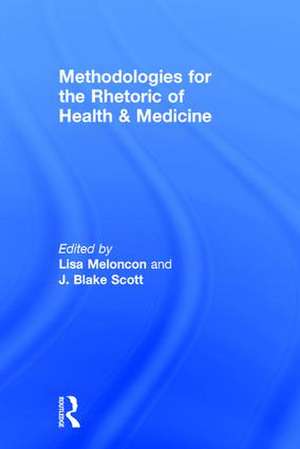Methodologies for the Rhetoric of Health & Medicine
Editat de Lisa Meloncon, J. Blake Scotten Limba Engleză Hardback – 27 iul 2017
Collectively, the volume’s 16 chapters:
- Develop, through extended examples of research, creative theories and methodologies for studying and engaging medicine’s high-stakes practices.
- Provide thick descriptions of and heuristics for methodological invention and adaptation that meet the needs of needs of new and established researchers.
- Discuss approaches to researching health and medical rhetorics across a range of contexts (e.g., historical, transnational, socio-cultural, institutional) and about a range of ethical issues (e.g., agency, social justice, responsiveness).
| Toate formatele și edițiile | Preț | Express |
|---|---|---|
| Paperback (1) | 391.29 lei 6-8 săpt. | |
| Taylor & Francis – 14 iul 2017 | 391.29 lei 6-8 săpt. | |
| Hardback (1) | 764.20 lei 6-8 săpt. | |
| Taylor & Francis – 27 iul 2017 | 764.20 lei 6-8 săpt. |
Preț: 764.20 lei
Preț vechi: 1027.40 lei
-26% Nou
Puncte Express: 1146
Preț estimativ în valută:
146.25€ • 151.39$ • 123.61£
146.25€ • 151.39$ • 123.61£
Carte tipărită la comandă
Livrare economică 06-20 martie
Preluare comenzi: 021 569.72.76
Specificații
ISBN-13: 9781138235854
ISBN-10: 1138235857
Pagini: 330
Ilustrații: 10
Dimensiuni: 152 x 229 mm
Greutate: 0.45 kg
Ediția:1
Editura: Taylor & Francis
Colecția Routledge
Locul publicării:Oxford, United Kingdom
ISBN-10: 1138235857
Pagini: 330
Ilustrații: 10
Dimensiuni: 152 x 229 mm
Greutate: 0.45 kg
Ediția:1
Editura: Taylor & Francis
Colecția Routledge
Locul publicării:Oxford, United Kingdom
Public țintă
Postgraduate and ProfessionalCuprins
Acknowledgements
List of Figures and Tables
Contributors
Chapter 1: Manifesting Methodologies for the Rhetoric of Health and Medicine
J. Blake Scott and Lis Meloncon
Chapter 2: Historical Work in the Discourses of Health and Medicine
Susan Wells and Nathan Stormer
Chapter 3: Ecological Investments and the Circulation of Rhetoric: Studying the "Saving Knowledge" of Dr Emma Walker’s Social Hygiene Lectures
Dan Ehrenfeld
Chapter 4: Infrastructural Methodology: A Case in Protein as Public Health
Nathan R. Johnson
Chapter 5: Health Communication Methodology and Race
Kelly E. Happe
Chapter 6: Bringing the Body Back Through Performative Phenomenology
Lisa Meloncon
Chapter 7: "No Single Path": Desire Lines and Divergent Pathographies in Health and Medicine
Catherine C. Gouge
Chapter 8: Rhetorically Listening for Microwithdrawals of Consent in Research Practice
Kristin M. Bivens
Chapter 9: Medical Interiors: Materiality and Spatiality in Medical Rhetoric Research Methods
Jennifer Edwell
Chapter 10: Ethical Research in "Health 2.0": Considerations for Scholars of Medical Rhetoric
Dawn S. Opel
Chapter 11: Negotiating Informed Consent: Bueno aconsejar, major remediar (it is good to give advice, but it is better to solve the problem)
Laura Maria Pigozzi
Chapter 12: Translingual Rhetorical Engagement in Transcultural Health Spaces
Rachel Bloom-Pojar
Chapter 13: Assemblage Mapping: A Research Methodology for Rhetoricians of Health and Medicine
Elizabeth L. Angeli
Chapter 14: Medicalized Mosquitoes: Rhetorical Invention in Genetic Engineering for Disease Control
Molly Hartzog
Chapter 15: Experiments in Rhetoric: Invention and Neurorhetorical Play
David R. Gruber
List of Figures and Tables
Contributors
Chapter 1: Manifesting Methodologies for the Rhetoric of Health and Medicine
J. Blake Scott and Lis Meloncon
Chapter 2: Historical Work in the Discourses of Health and Medicine
Susan Wells and Nathan Stormer
Chapter 3: Ecological Investments and the Circulation of Rhetoric: Studying the "Saving Knowledge" of Dr Emma Walker’s Social Hygiene Lectures
Dan Ehrenfeld
Chapter 4: Infrastructural Methodology: A Case in Protein as Public Health
Nathan R. Johnson
Chapter 5: Health Communication Methodology and Race
Kelly E. Happe
Chapter 6: Bringing the Body Back Through Performative Phenomenology
Lisa Meloncon
Chapter 7: "No Single Path": Desire Lines and Divergent Pathographies in Health and Medicine
Catherine C. Gouge
Chapter 8: Rhetorically Listening for Microwithdrawals of Consent in Research Practice
Kristin M. Bivens
Chapter 9: Medical Interiors: Materiality and Spatiality in Medical Rhetoric Research Methods
Jennifer Edwell
Chapter 10: Ethical Research in "Health 2.0": Considerations for Scholars of Medical Rhetoric
Dawn S. Opel
Chapter 11: Negotiating Informed Consent: Bueno aconsejar, major remediar (it is good to give advice, but it is better to solve the problem)
Laura Maria Pigozzi
Chapter 12: Translingual Rhetorical Engagement in Transcultural Health Spaces
Rachel Bloom-Pojar
Chapter 13: Assemblage Mapping: A Research Methodology for Rhetoricians of Health and Medicine
Elizabeth L. Angeli
Chapter 14: Medicalized Mosquitoes: Rhetorical Invention in Genetic Engineering for Disease Control
Molly Hartzog
Chapter 15: Experiments in Rhetoric: Invention and Neurorhetorical Play
David R. Gruber
Notă biografică
Lisa Meloncon is Associate Professor of Technical Writing at the University of South Florida. She is the founder and coordinator of the biennial Symposium for the Rhetoric of Health & Medicine. Her research in the rhetoric of health & medicine includes work with disability and embodiment, an historical study of vernacular healing, and understanding the impact of place on healthcare communication.
J. Blake Scott is Professor of Writing and Rhetoric and member of the Texts & Technology Ph.D. faculty at the University of Central Florida. His research in the rhetoric of health & medicine includes studies of HIV testing and prevention practices and of global pharmaceutical policy debates.
J. Blake Scott is Professor of Writing and Rhetoric and member of the Texts & Technology Ph.D. faculty at the University of Central Florida. His research in the rhetoric of health & medicine includes studies of HIV testing and prevention practices and of global pharmaceutical policy debates.
Descriere
Methodologies for the Rhetoric of Health & Medicine charts new methodological territories for rhetorical studies and the emerging field of the rhetoric of health and medicine. It advances the larger goal of differentiating the rhetoric of health and medicine as a distinct but pragmatically diverse area of study.
